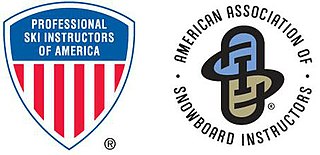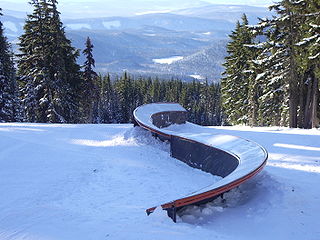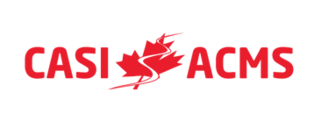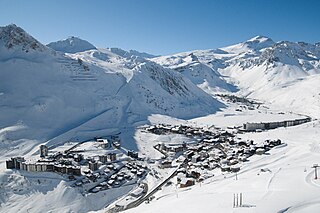Qualifications
BASI provides and trains for qualifications in alpine skiing, snowboarding, telemark, nordic skiing and adaptive skiing. Like most snowsport certification organisations worldwide, it offers different levels of certification based on the instructors qualification progress. For example, in alpine skiing it offers four levels, namely:

Alpine skiing, or downhill skiing, is the pastime of sliding down snow-covered slopes on skis with fixed-heel bindings, unlike other types of skiing, which use skis with free-heel bindings. Whether for recreation or sport, it is typically practised at ski resorts, which provide such services as ski lifts, artificial snow making, snow grooming, restaurants, and ski patrol.

Snowboarding is a recreational activity and Winter Olympic and Paralympic sport that involves descending a snow-covered slope while standing on a snowboard attached to a rider's feet.

Telemark[²teːləmɑrk](listen) is a traditional region and county in Norway. It is known as the birthplace of skiing and the Bunad movement. The region borders Vestfold, Buskerud, Hordaland, Rogaland and Aust-Agder. Telemark means the "mark of the Teler", the ancient North Germanic tribe that inhabited what is now known as Upper Telemark in the Migration Period and the Viking Age.
- Alpine Level 1 Instructor, this qualification is for those instructors wishing to work on artificial slopes
- UK Advanced Instructor, this qualification is for senior instructors wishing to work on artificial slopes
- Alpine Level 2 Instructor, this qualification is for those instructors wishing to work in a mountain environment, part-time or seasonal, working within a snowsport school
- Alpine Level 3 ISIA this qualification is for international instructors working full-time within international snowsports schools
- Alpine Level 4 ISTD (International Ski Teacher Diploma) this qualification is for international instructors working in snosports as a career within snowsports schools or as an independent
There are similar certification levels across snowboarding, telemark, nordic skiing and adaptive skiing.

Nordic skiing encompasses the various types of skiing in which the toe of the ski boot is fixed to the binding in a manner that allows the heel to rise off the ski, unlike Alpine skiing, where the boot is attached to the ski from toe to heel. Recreational disciplines include cross-country skiing and Telemark skiing.
The Alpine and Snowboard Level 1 can be extended to a "Senior Instructor UK" qualification via a shortened version of the mountain environment Level 2 course. The Senior Instructor qualification is targeted at those who only intend to work on artificial slopes.
BASI also provide their own set of coaching qualifications.

Skiing can be a means of transport, a recreational activity or a competitive winter sport in which the participant uses skis to glide on snow. Many types of competitive skiing events are recognized by the International Olympic Committee (IOC), and the International Ski Federation (FIS).

A dry ski slope or artificial ski slope is a ski slope that mimics the attributes of snow using materials that are stable at room temperature, to enable people to ski, snowboard or snow tube in places where natural, snow-covered slopes are inconvenient or unavailable.

Telemark skiing is a skiing technique that combines elements of Alpine and Nordic skiing. Telemark skiing is named after the Telemark region of Norway, where the discipline originated. Sondre Norheim is often credited for first demonstrating the turn in ski races, which included cross country, slalom and jumping, in Norway around 1868. Sondre Norheim also experimented with ski and binding design, introducing side cuts to skis and heel bindings.

A sommelier, or wine steward, is a trained and knowledgeable wine professional, normally working in fine restaurants, who specializes in all aspects of wine service as well as wine and food pairing. The role in fine dining today is much more specialized and informed than that of a wine waiter. Sommeliers Australia states that the role is strategically on par with that of the chef de cuisine.

Ski patrols are organizations that provide medical, rescue, and hazard prevention services to the injured in ski area boundaries, or sometimes beyond into backcountry settings. Many have technical-medical certifications, such as Outdoor Emergency Care (OEC) provided by the National Ski Patrol (USA), that are specific to the winter-season environment and providing emergency medical services in remote locations. Many patrollers also hold EMS issued credentials, such as emergency medical technician or any other pre-hospital care certification. Due to the remote location and terrain, transportation is often limited to ski toboggan, snowmobile, or, for life-compromising injuries or extremely remote terrain, helicopter rescue. Depending on the ski area terrain, ski patrollers can be versed in a large variety of specialized rescues, such as avalanche search and rescue, outdoor emergency transportation, chairlift evacuation, and, in some cases, helicopter rescue techniques are taught. Patrols work to promote ski safety, enforce area policies, and help the injured within their jurisdiction. Ski patrollers also work to set up the mountain before it opens by conducting trail checks, providing avalanche control work, and setting up necessary equipment in preparation for the day. At the end of the day, they also conduct a sweep clearing the mountain for off-hours.

The Professional Ski Instructors of America andAmerican Association of Snowboard Instructors (PSIA-AASI) is the world’s largest nonprofit education association dedicated to promoting the sports of skiing and snowboarding through instruction. With more than 32,500 members instructing at 300 member ski and snowboard schools, PSIA-AASI establishes certification standards for snowsports instructors and develops education materials to be used as the core components of instructor training.

The nonprofit National Ski Patrol (NSP) is the largest winter education organization in the world. The NSP provides education, outreach, and credentialing related to outdoor recreation and safety. It is currently composed of more than 26,000 members who serve in over 600 patrols. NSP members, both volunteer and paid, ensure the safety of outdoor recreation enthusiasts in ski areas throughout the United States of America and certain military areas of Europe. For its dedication to the promotion of public safety in skiing and other winter sports, the group was granted a congressional charter under Title 36 of the United States Code in 1980.

Alpine Canada is the governing body for alpine ski racing in Canada. Alpine Canada represents coaches, officials, supporters and athletes, including the racers of the Canadian Alpine Ski Team, Canada's Ski Cross Team and the Canadian Para-Alpine Ski Team. Alpine Canada is also involved in promoting participation within Canada's four million recreational skiers.
The Canadian Ski Instructors' Alliance (CSIA), founded in 1938, is an association of more than twenty thousand professional skiers located across Canada. The CSIA's purposes are to ensure a nationwide ski teaching standard through the development of effective skiing techniques and teaching methods and promote the importance of ski safety. The organization grants four general levels of certification, as well as several module certifications, such as snow park instruction, mogul skiing, and super giant slalom skiing. Each successive level demonstrates competence in ski instruction, pedagogy, as well as individual ski performance. As such, the highest level (four) is difficult to attain, with only a handful of instructors holding that level within each region. Lately, the CSIA came up with a merit certification for ski instructors that were part of the organization for twenty-five or more consecutive years. The celebrated members are normally awarded a "25-year member" pin, as well as a certificate, recognizing their efforts in the field.
Canadian Adaptive Snowsports (CADS) is a volunteer-driven organization dedicated to "assisting individuals with a disability to lead richer and fuller lives through active participation in recreational and competitive snow skiing and snowboarding." Disabled skiing can also be referred to as para-alpine skiing or adaptive skiing. CADS is the national level organization comprising 11 divisions — one for each of 10 provinces and one for the National Capital Region. In 2006, there were more than 3,000 members committed to the idea that "Skiing is for Everyone and Everyone can Ski!"

Mt. Brighton is a ski and snowboard area in Brighton, Michigan, that opened in 1960. As no hills large enough for commercial skiing or snowboarding exist naturally in Brighton, Mt. Brighton's slopes are man-made and reach a maximum height of 230 vertical feet. Mt. Brighton has 5 chairlifts and 7 surface lifts. Silver is the longest and newest of the 25 runs, running 1,350 feet. A terrain park, featuring rails, boxes, and jumps, is available to freestyle skiers and snowboarders. Almost all of the snow on Mt. Brighton is created artificially using water stored in an on-site reservoir and industry standard snowmaking equipment.

The A Level is a subject-based qualification conferred as part of the General Certificate of Education, as well as a school leaving qualification offered by the educational bodies in the United Kingdom and the educational authorities of British Crown dependencies to students completing secondary or pre-university education. A number of countries, including Singapore, Uganda, Kenya, Mauritius and Zimbabwe have developed qualifications with the same name as and a similar format to the British A Levels. Obtaining an A Level, or equivalent qualifications, is generally required for university entrance, with universities granting offers based on grades achieved.
The Ski Club of Ireland owns and runs the largest artificial ski slope in Ireland. It is located in County Wicklow close to the village of Kilternan.

The following outline is provided as an overview of and topical guide to skiing:
The BUSC or British Universities Snowsports Council was active between 1990–2014 with the motto 'Run by students, for students', its sole aim was to promote and increase participation and competition in skiing and snowboarding at all levels for students in the United Kingdom, it was a unique students sporting organisation as it was run by students for students. An annual vote would be held in November at BUDS to elect a new committee, who would commence running BUSC and upholding the BUSC constitution from the following April for one year. In 2014 Wasteland Ski took over running over the event, ending the student led era.
The Institute for the Management of Information Systems (IMIS), previously called the Institute of Data Processing Management (IDPM), is the leading international association promoting excellence in the field of Information Systems Management through professional association and education. Its headquarters is in the United Kingdom, and it has approximately 12,000 members the majority of whom reside outside the UK. The Institute was founded in 1978 and is a registered charity. The Institute has consistently played a prominent role in fostering greater understanding of the importance of Information Systems management, working to enhance the status of those engaged in the profession, and promoting higher standards through better education and training, both in the UK and overseas.
The Russian Ski Association (RSA) is a non-governmental organization, which represents Russian ski sports in the international field. Organization includes 4 all-Russian sports Federations: Russian Alpine Skiing and Snowboard Federation, Cross-Country Ski Federation of Russia, Freestyle Federation of Russia, Ski Jumping and Nordic Combined Federation of Russia.

The Canadian Association of Snowboard Instructors (CASI) is Canada's national professional snowboard teaching organisation. The organisation's headquarters are in Cambridge, Ontario, Canada and it is organised into six regions across Canada.
This glossary of skiing and snowboarding terms is a list of definitions of terms and jargon used in skiing, snowboarding, and related winter sports.


















